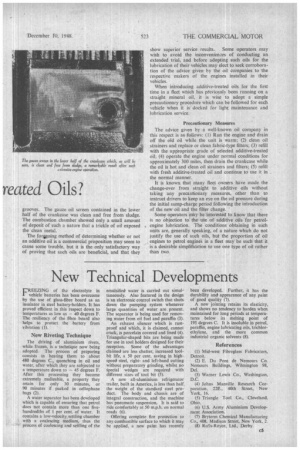New Technical Developments
Page 41

If you've noticed an error in this article please click here to report it so we can fix it.
L'REEZING of the electrolyte in
vehicle batteries has been overcome by the use of glass-fibre board as an insulator in steel battery-holders. It has proved efficient in this respect down to temperatures as low as — 40 degrees F. The resiliency of the fibre board also helps to protect the battery from vibration (1).
New Riveting Technique The driving of aluminium rivets, while frozen, is a technique now being adopted. The process of preparing consists in heating them to about 480 degrees C., quenching in oil and water, after which they are subjected to a temperature down to — 45 degrees F. After this processing they become extremely malleable, a property they retain for only 30 minutes, or 90 Minutes if packed in cellophane bags (2).
A water separator has been developed which is capable of ensuring that petrol does not contain more than one fivehundredths of 1 per cent. of water. It contains a low-velocity settling chamber with a coalescing medium, thus the
.4 process of coalescing and settling of the emulsified water is carried out simultaneously. Also featured in the design is an electronic control switch that shuts down the pumping system whenever large quantities of water are present. The separator is being used for removing water from oil fuel and paraffin (3).
An exhaust silencer which is rustproof and which, it is claimed, cannot crack, is porcelain covered and lined (4). Triangular-shaped bits are being made for use in tool holders designed for their reception. Some of the advantages claimed are less chatter, increased toolbit life, a 50 per cent. saving in highspeed steel, rightand left-hand cutting without preparatory grinding, whilst no Special wedges are required with different sizes•of tool bit (5).
A new all-aluminium refrigerator trailer, built in America, is less than half. the weight of the standard steel product. The body and chassis are of integral construction, and the machine has pneumatic suspension. It is said to ride comfortably at 50 m.p.h. on normal roads (6).
Offering complete fire protection to any combustible surface to which it may be applied, a new paint has recently been developed. Further, it has the durability and appearance of any paint of good quality (7).
A new jointing retains its elasticity, and shows no tendency to harden when maintained for long periods at temperatures below its melting point of 195 degrees C. It is insoluble in petrol, paraffin, engine lubricating oils, trichlorethylene, and the more common industrial organic solvents (8).
References
(1) Mid-west Fibreglass Fabricators, Detroit.
(2) E. Du Pont de Nemours Co. Nemours Buildings, Wilmington 98, Del.
(3) Warner Lewis Co., Washington, D.C.
(4) Johns Manville Research Corporation, 22E., 40th Street, New York, 16.
(5) Triangle Tool Co., Cleveland, Ohio.
(6) U.S. Army Aluminium Development Association.
(7) Bryterm Chemical Manufacturing Co., 408, Madison Street, New York, 2.
(8) Roils-Royce, Ltd., Derby.
























































































